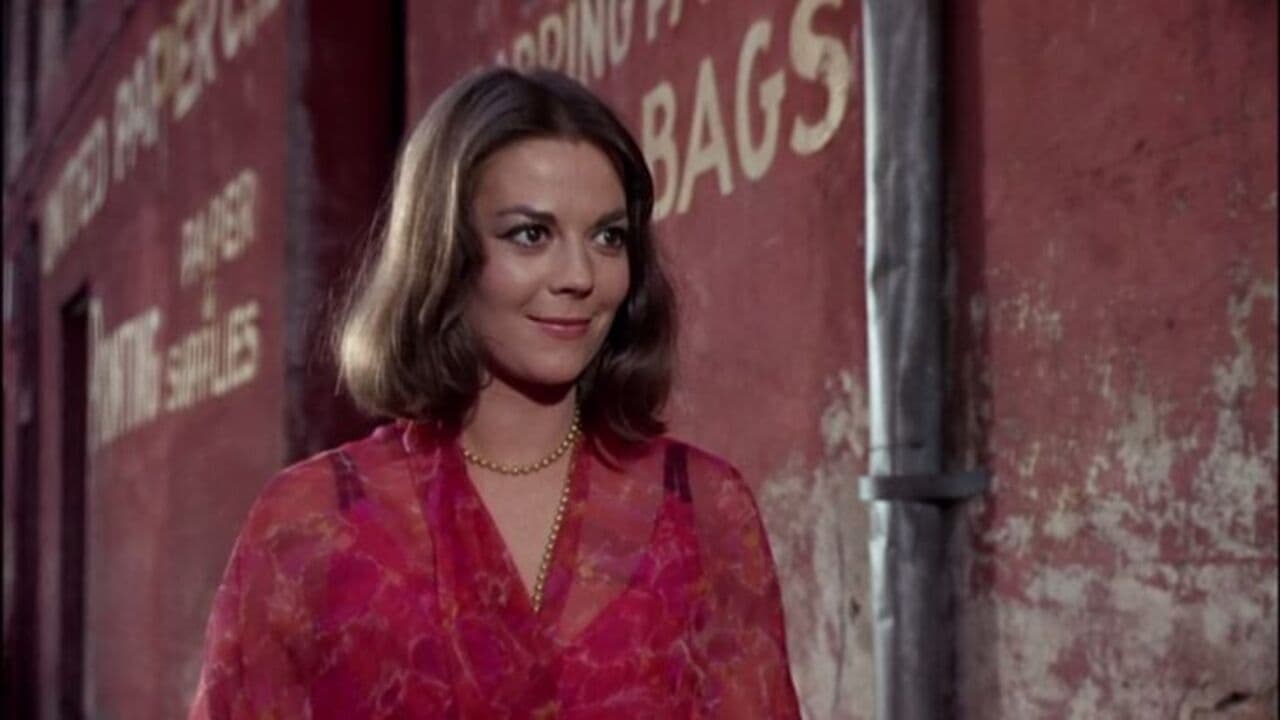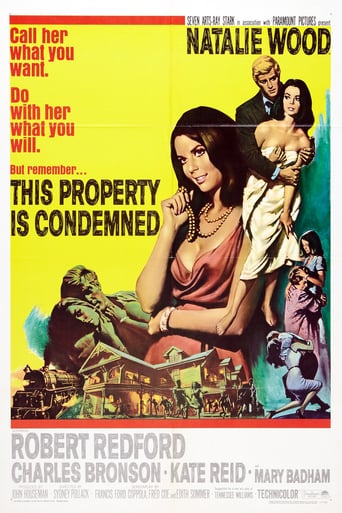

Am I Missing Something?
... View MoreA waste of 90 minutes of my life
... View MoreAlthough it has its amusing moments, in eneral the plot does not convince.
... View MoreIt is encouraging that the film ends so strongly.Otherwise, it wouldn't have been a particularly memorable film
... View MoreDrama takes place during the Depression. Owen Legate (Robert Redford) goes to a small town in Mississippi to lay off railroad workers (the towns only source of income). There he meets wild Alva Starr (Natalie Wood) and her overbearing mother Hazel (Kate Reid). Alva wants to get out of the town and see Owen as her ticket...but her mother has other ideas. It's all ends tragically.This was based on one of Tennessee Williams' one act plays. It was adapted by THREE writers (one being the unknown Francis Coppola). When Williams saw the final result he was (understandably) horrified. It's easy to see why--this just comes across as a very bad Williams play. It moves slowly, has characters making speeches instead of talking and has sexual situations that were probably shocking in their day but are merely tame (and silly) today. Abrupt ending too. Worst of all is Redford who gives a TERRIBLE performance. Totally stone-faced throughout showing no reaction or feelings at all. This film gets a 5 because it IS well-done. It looks good and captures the feel of its era pretty convincingly. Also Reid and Wood are excellent in their roles giving this better performances than it deserves. Those two alone make this worth watching at least once. I'm giving this a marginal recommendation because of those two. Look for a very young Robert Blake and Charles Bronsan in small roles.
... View MoreIn 1961's "Splendor in the Grass," Natalie Wood gave what is perhaps her finest performance, an Oscar-worthy one, playing the part of Wilma Dean ("Deanie") Loomis, a lovesick teenager in Depression-era Kansas. Five years later, Natalie played a similar role, with some important differences, in the film adaptation of Tennessee Williams' one-act play "This Property Is Condemned." Told in flashback via the reminiscences of her younger sister Willie (Mary Badham, who most viewers will know as Scout from 1962's "To Kill a Mockingbird"), the film tells the story of Alva Starr, "the main attraction" in the fictitious town of Dodson, Mississippi in the early '30s. Alva, it seems, was a beautiful young woman who was used by her mother to attract men to her boardinghouse, but Alva--a dreamy, fantasizing sort whose primary ambition was to get out of this small town and go to New Orleans--never really fell in love until she met Owen Legate (Robert Redford), a hatchet man for the railroad who came to Dodson to lay off many of its male workers. Thus, before long, Alva was having an affair with the most unpopular man in town....An entire treatise could be written comparing the characters of Deanie and Alva, but let's keep things simple here and say that both young women become involved in first love affairs that lead to unfortunate conclusions; both have unlikable mothers who interfere with their love lives; both are living in small towns in the early days of the Depression. But whereas Deanie was virginal, and a woman whose frustrated love drove her to the brink of insanity, Alva was anything but, and she at least got to share some passionate moments with the man she lusted after. Natalie Wood, it should be said here, looks absolutely gorgeous in "This Property" (indeed, the woman grew more beautiful every year that she lived!), and director Sydney Pollack, in this, his second film, wisely gives her any number of stunning close-ups. (Pollack and Redford, of course, would go on to work together professionally for many years, in films such as "Jeremiah Johnson," "The Way We Were," "Three Days of the Condor" and "The Electric Horseman.") Natalie and Redford make a handsome-looking couple, to put it mildly; they had just appeared together in "Inside Daisy Clover" the year before. Pollack's direction is just fine here, in his sophomore film effort, DOP James Wong Howe's work is typically excellent (I love his soaring camera work as Alva enters New Orleans by train, and in the film's very last scene), Edith Head's costumes are marvelous, and co-screenwriter Francis Ford Coppola's script is just aces. So why does the often-dubious Maltin film guide call the picture "absurd" and "trash" and give it a lousy 2 stars (the same rating it gives "Taxi Driver," please recall)? Don't ask me. I feel that Natalie Wood is just terrific in this film, and she is given many scenes in which to shine. Just check out how great she is in her drunken scene, telling off her mother (Kate Reid) and coming on to the brutish J.J. (a well-cast Charles Bronson). So does the film allow a happy ending for Alva and her hunky Owen? Well, let's just say that portents such as Alva's breathing problems, a discussion of the 1932 tearjerker "One Way Passage," and an afternoon stroll through a New Orleans cemetery might give that answer away. Wilma Dean may have appeared in the superior film and lived to tell her tale, but at least the tragic Alva had more fun. "Just because some people might think I'm beautiful that doesn't mean I'm everybody's property," she tells Owen at one point. Turns out that the film's title doesn't just refer to the dilapidated Starr Boardinghouse!
... View MoreTennessee Williams' one-act play about a loose-living belle down Mississippi way during the Depression who cottons to the new renter in her mama's boarding-house becomes an overblown star-vehicle for Natalie Wood and Robert Redford. Though well-produced, and with some very sensitive passages, the picture never quite gets going...and fails to wrap itself up satisfactorily. Redford is the railroad employee from New Orleans who pulls into a whistle-stop town to lay-off many of the workers; Wood teases and taunts him before deciding she loves him, though it may be too late. The characters act so rashly--biting and clawing at one another blindly, without thinking--that the two leads never manage to create a moving or sympathetic rapport. By the final third, the narrative has stopped making logical sense; director Sydney Pollack seems to hope that by coasting through solely on emotion, he'll be able to get us to the finish-line on good will alone. Unfortunately, the screenplay just isn't persuasive enough, nor are the performances strong enough, to negate the movie's weaknesses. ** from ****
... View Morethis movie is so difficult to comment on. in many ways it is deeply flawed. the music is simply awful, absolutely wrong, the performances at times feel staged, and the direction too loose. and yet despite this - this is a wonderful film.i think it is simply the quality of natalie wood, not her performance which again is actually quite week. sometimes she seems to lose concentration and flits in and out of character - but this is a challenging role and one that i cannot believe another actress could play better. wow she takes your breath away - filling you with such strange sensations of warmth, pity and anger. i cant think of a performance that has moved me so much.she of course lived pretty much a tennessee Williams' story in her own right - except williams would have eschewed the melodrama and the intrigue of her death. and i think that is why she is so compelling in this, because she is simply revealing herself - and what we see is beautiful.
... View More